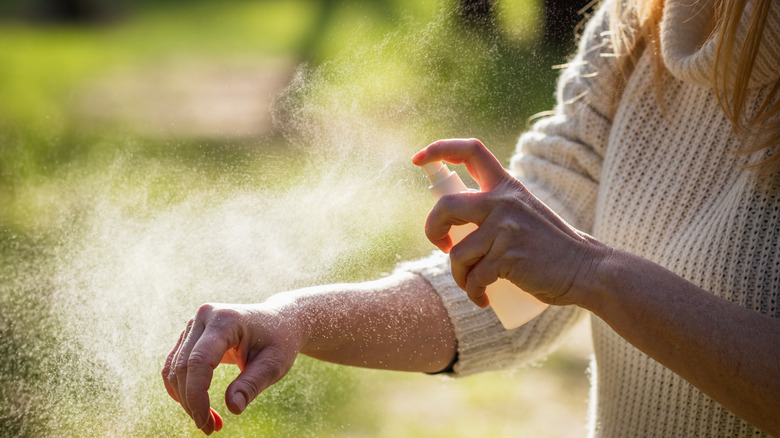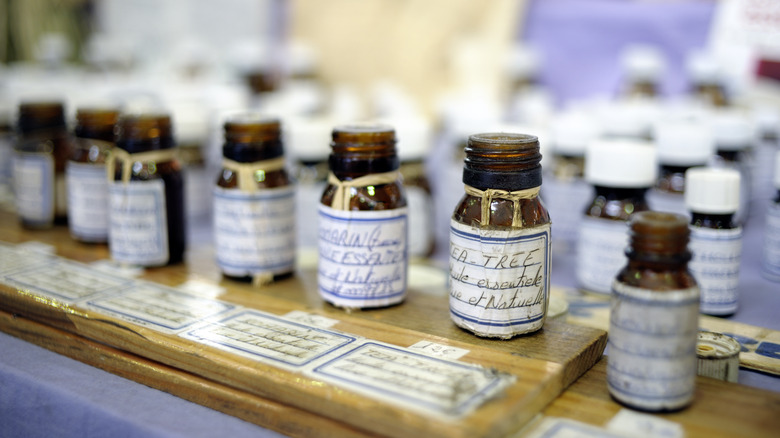How To Make A Natural All-Purpose Insect Repellent That Actually Smells Good
Making your own insect repellent is fairly easy. But deciding which essential oils to use can determine if the resulting mixture smells pleasant, or ... not so pleasant. Fortunately, many of the essential oils that are best for repelling insects actually smell really good, and there is such a wide selection of effective ones to choose from that you can create your own blend suited to your scent preferences. Knowing which essential oils work for this purpose, and then choosing which ones to use in a blend, is key to creating an effective insect-repellent formula that also smells nice.
One tip for achieving a pleasant-smelling blend is to replace the often-used citronella essential oil with geranium: the plants these oils come from are very closely related, and both repel insects, but geranium has a much more pleasing scent. Citronella is so strong that it tends to overpower other oils in a blend, but this is not true of all essential oils. If any essential oils don't smell good to you on their own, chances are you won't like them in a blend, but sometimes when they are mixed together a whole new fragrance profile emerges.
Still, there is no need to study perfumery to create an effective insect repellent; a bit of research and experimentation will yield a recipe that works for you. This article will contain some recipes for different essential oils to blend together, so you can smell good while keeping the bugs away.
How to make a good natural insect repellent blend
You will need to create a base to dilute the essential oils using distilled water, spring water, rose water, or simple tap water. If using tap water that contains chlorine, let it sit for an hour so the chlorine dissipates. You will also need a dispersant to help the essential oils to spray more effectively: a bit of vodka or gin will do the trick, or some white or apple cider vinegar (and apple cider vinegar also soothes insect bites).
A glass spray bottle is best, as sometimes plastic tends to break down when exposed to essential oils. You can get amber or blue glass bottles with sprayers from various suppliers: these are best as sunlight can lessen the effectiveness of some essential oils over time, and the colored glass protects from this happening. To four ounces of water, add a teaspoon of vodka, gin, or vinegar. Then add 20-25 drops total of essential oils.
You can use as many oils as you like, but between five and six is plenty for a good blend. Shake gently before each use to help the oils blend and disperse more effectively, and store the bottle in a cool, dry place. As with commercial bug sprays, your natural insect repellent should not be used on or near cats, who are very sensitive to essential oils.
Recipe ideas for nice-smelling insect repellent blends
The essential oils useful for making insect repellent include lemongrass, cedarwood, geranium, lavender, lemon, peppermint, tea tree, pine, vetiver, eucalyptus, basil, patchouli, and rosemary. In addition to using any of these in a blend, you can add a drop or two of patchouli. This earthy fragrance is an effective insect repellent, but has the added bonus of helping meld other oils together. Even if you don't like patchouli on its own, a drop or two in a blend is less noticeable, but grounds the other scents together in a pleasing way.
For a green, herby scent, try the following oils in your blend (using the formula mentioned above): 5 drops lemongrass, 5 drops basil, 5 drops rosemary, 3 drops pine, 3 drops lavender, and one drop of patchouli. For a somewhat minty, refreshing scent, try: 5 drops peppermint, 5 drops eucalyptus, 5 drops pine, 3 drops rosemary, and 3 drops lavender. For an earthy, woodsy scent: 6 drops cedarwood, 5 drops pine, 3 drops vetiver, 3 drops patchouli, 3 drops basil. For a lighter, more floral-citrus scent, try: 5 drops geranium, 5 drops lemongrass, 5 drops lavender, 3 drops basil, 3 drops lemon.
These measurements are only suggestions, and you can experiment to find the right combination that you enjoy. You'll need to apply your spray more frequently than commercial insect repellents, because the ingredients are milder than the strong chemicals used in many bug sprays. And as a bonus, yours will smell better, too.


